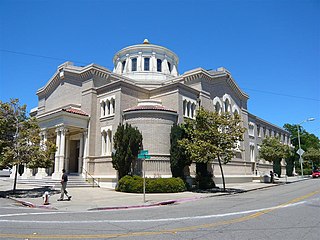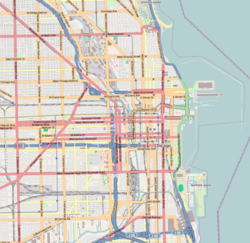
Reform Judaism, also known as Liberal Judaism or Progressive Judaism, is a major Jewish denomination that emphasizes the evolving nature of Judaism, the superiority of its ethical aspects to its ceremonial ones, and belief in a continuous revelation which is closely intertwined with human reason and not limited to the Theophany at Mount Sinai. A highly liberal strand of Judaism, it is characterized by little stress on ritual and personal observance, regarding Jewish law as non-binding and the individual Jew as autonomous, and by a great openness to external influences and progressive values.

Emil Gustav Hirsch was a Luxembourgish-born Jewish American biblical scholar, Reform rabbi, contributing editor to numerous articles of The Jewish Encyclopedia (1906), and founding member of the NAACP.

David Einhorn was a German rabbi and leader of Reform Judaism in the United States. In 1855, he became the first rabbi of the Har Sinai Congregation in Baltimore, the oldest Jewish-American congregation affiliated with the Reform movement since its inception. While there, he created an early American prayer book for the congregation that became one of the progenitors of the 1894 Union Prayer Book.

Kaufmann Kohler was a German-born Jewish American biblical scholar and critic, theologian, Reform rabbi, and contributing editor to numerous articles of The Jewish Encyclopedia (1906).

Rodef Shalom Congregation is an historic Reform Jewish congregation and synagogue located at 4905 Fifth Avenue, Pittsburgh, Pennsylvania, in the United States. The landmark building was designed by architect Henry Hornbostel and completed in the Beaux-Arts style.

Congregation Beth Elohim, also known as the Garfield Temple and the Eighth Avenue Temple, is a Reform Jewish congregation and historic synagogue located at 274 Garfield Place and Eighth Avenue, in the Park Slope neighborhood of Brooklyn in New York City, New York, United States.

Temple Beth El is a Reform synagogue located at in Bloomfield Township, Oakland County, Michigan, in the United States. Beth El was founded in 1850 in the city of Detroit, and is the oldest Jewish congregation in Michigan. Temple Beth El was a founding member of the Union for Reform Judaism in 1873, and hosted the meeting in 1889 during which the Central Conference of American Rabbis was established.

Temple Sinai is a Reform Jewish congregation and synagogue located at 2808 Summit Street in Oakland, California, in the United States. Founded in 1875, it is the oldest Jewish congregation in the East San Francisco Bay region.

Congregation Beth Israel is a Reform Jewish congregation and synagogue, located at 10460 North 56th Street in Scottsdale, Arizona, in the United States. Incorporated in 1920, the congregation affiliated with the Union for Reform Judaism in 1935.

Temple Emanuel Sinai is a Reform Jewish congregation and synagogue located at 661 Salisbury Street, Worcester, Massachusetts, in the United States.

The Sinai Temple is a Conservative synagogue located at 10400 Wilshire Boulevard, Westwood, Los Angeles, California, in the United States. The Sinai Temple congregation is the oldest and largest Conservative congregation in the greater Los Angeles area.

Temple De Hirsch Sinai is a Reform Jewish congregation with synagogues at campuses in Seattle and nearby Bellevue, Washington, in the United States. The congregation was formed as a 1971 merger between the earlier Temple De Hirsch and Temple Sinai and is the largest Reform congregation in the Pacific Northwest.

Temple Israel is a Reform Jewish congregation and synagogue located at 1376 East Massey Road, in Memphis, Tennessee, in the United States. It is the only Reform synagogue in Memphis, the oldest and largest Jewish congregation in Tennessee, and one of the largest Reform congregations in the U.S. It was founded in 1853 by mostly German Jews as Congregation B'nai Israel. Led initially by cantors, in 1858 it hired its first rabbi, Jacob Peres, and leased its first building, which it renovated and eventually purchased.
Har Sinai – Oheb Shalom Congregation is a Reform Jewish congregation and synagogue located at 7310 Park Heights Avenue, in Pikesville, Baltimore County, Maryland, in the United States. Established in 1842 in Baltimore and known as Har Sinai Congregation, and in 1853 near Camden Yards as Temple Oheb Shalom, the two congregations merged in 2019 and is the oldest Reform congregation in the United States that has used the same prayer rite since its inception.

Nannie Aschenheim Reis was a newspaper columnist, clubwoman, and congregational leader in the Chicago Jewish community from approximately 1900 to 1940. She was a personal acquaintance of Jane Addams and worked closely with Hannah G. Solomon.

Congregation Shaare Emeth is a Reform Jewish congregation and synagogue located at 11645 Ladue Road, in Creve Coeur, St. Louis County, Missouri, in the United States.

Reform Congregation Keneseth Israel, abbreviated as KI, is a Reform Jewish congregation and synagogue located at 8339 Old York Road, Elkins Park, just outside the city of Philadelphia, Pennsylvania, in the United States. Founded in Philadelphia in 1847, it is the sixth oldest Reform congregation in the United States, and, by 1900, it was one of the largest Reform congregations in the United States. The synagogue was at a number of locations in the city before building a large structure on North Broad Street in 1891, until 1956 when it moved north of the city to suburban Elkins Park.
Hyman Gerson Enelow was a Russian-born American rabbi of the New York Congregation Emanu-El.
Joseph Stolz was an American rabbi who ministered in Chicago for most of his life.
Maximilian Heller was a Czech-born American rabbi.


















